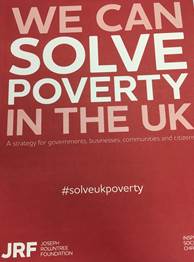I’ve just come back from the Social Innovation Conference, hosted by York St John University (YSJU) my head spinning with ideas and ultimately with an overwhelming sense of positivity. The conference was organised by YSJ MBA students and supported financially by York Business School and a Social Enterprise Grant – an initiative by the University’s Vice Chancellor to stimulate social innovation and social enterprise in the University. The aim of the conference was to bring York charities, the voluntary sector and local businesses together to promote synergies and social enterprise; to make a strong unit that ‘works together to make York better’.
Jane Hustwit, Chair of York CVS introduced the conference telling us it was a time to learn, share challenge and provoke. From there we listened to a series of three speakers who certainly met all of these expectations.
Firstly, Sue Reece, Chair of Kyra Women’s Project gave some insightful statistics into why women are so important in the fight against poverty and then moved on to some very moving real-life examples of how Kyra had changed the lives of individuals. For example, 8 million UK women will not vote this year and yet women have such a huge impact on the economic prosperity of families and community around the world. On average, globally, women reinvest 90% of their income into their families, whilst men invest only 30%. As Roshaneh Zaraf (founder and MD of the Kashf Foundation) said, “If we empower women we empower society.” On a personal level, I was really pleased that we opened talking directly about issues specific to women and the role that women can play in reducing poverty, and this also seemed to be echoed by questions and contributions from participants.
Next to speak was Dr Mike Hemmings, a lecturer in Human Resource Management at YSJU. Mike discussed the article he has written in Voluntary Sector Review: “The Constraints on Voluntary Sector Voice in a Period of Constrained Austerity.” The article used a 10 year qualitative longitudinal research methodology and states that austerity accelerated the tendency for financial dependency to have a negative impact on the ability to express a critical voice. Dr Hemming’s article is available to download free during June.
The third speaker was Katie Schmuecker, Head of Policy at the Joseph Rowntree Foundation (JRF). JRF have just launched their strategy for governments, businesses communities and citizens to solve UK poverty, of which Katie is one of the authors and presented the headlines in her talk. The report presents some disheartening statistics about the levels of poverty in the UK but also sets out proposals to solve UK poverty and asserts that this is possible. All participants received a copy of the strategy and it is captivating reading which I’d urge you to download.
After listening to three varied and interesting speakers providing a huge amount of content, it was time for some work. We split into three groups to look at:
- How to apply the JRF poverty strategy in York
- Advocacy issues and challenges
- Learning and liaison – how local charities and voluntary organisation can work together effectively
The mood on returning to the main lecture theatre after the working groups was notably upbeat with a buzz and energy in the air. A key outcome from the conference was a shared desire to keep this energy going, share contacts and meet again in the future. Collaboration is so powerful – together we are more than the sum of our parts so I am delighted that there is this desire and look forward to the next social innovation event.


